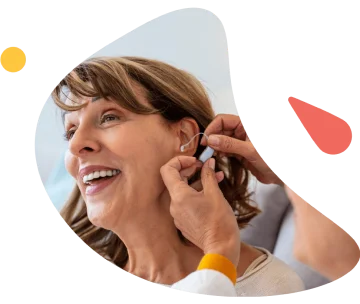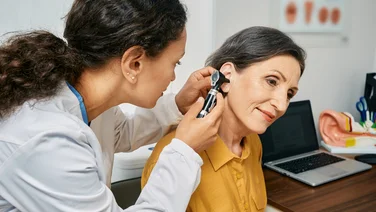If your hearing sounds muffled, or if it feels like there’s ‘cotton in your ears’, there’s likely a good explanation. Muffled hearing can come about gradually or suddenly, depending on the underlying problem. It may also occur in one ear or both ears. There are often common reasons for muffled hearing and it is not always an indicator that you are experiencing hearing loss.
Remember though that there is no substitute for seeking professional advice. We can help connect you to a local audiologist – just head to this short form.
Common causes of muffled hearing
Your ears are plugged with wax
You are most likely to start noticing that your hearing is becoming more and more muffled as the earwax builds over time. Avoid poking anything inside your ear, including Q-tips or cotton buds. Instead, clean your ears simply by using a washcloth. If you think you have a build-up of excess wax, speak to a pharmacist or see your audiologist.
You have asymmetric hearing loss
Asymmetric hearing loss means your hearing is worse in one ear than the other. It might feel as though the sound is muffled in the ear with poorer hearing. You may notice asymmetric hearing loss if you hold the phone up to each ear, and find that it’s clearer in the better ear.
The likelihood is that it’s something untoward that can be treated easily, so book a visit to your audiologist to get your hearing checked out.
You have an ear infection
If you have a middle ear infection (called otitis media), your ear may be infected by a virus, fungus, or bacterial infection. This is likely to affect your hearing temporarily, and sounds may be muffled in the affected ear. Ear infections often clear up on their own, but if you still have symptoms after five days, see a doctor to find out if you need treatment to resolve the infection.
You have eustachian tube dysfunction
This occurs when there’s a difference between air pressure inside and outside the body, like when your ears pop during a flight.
You have high-frequency hearing loss
You will have difficulty hearing high-pitched sounds when you have high-frequency hearing loss. This includes consonant sounds of speech more than vowel sounds.
With high-frequency hearing loss, you may be able to hear but not understand what people are saying. When you can’t hear the consonants of speech, the speaker sounds like they’re mumbling or not speaking clearly.
Are people mumbling or is it me?
We all experience a range of sounds and noises in our everyday lives, from a knock at the door, sirens, and alarms going off.
Plenty of people hear most things perfectly clearly, but struggle to hear or understand speech, whether it’s face-to-face conversations, over the telephone, or dialogue in a TV show.
People are mumbling if…
Some people report that it feels as though people are mumbling, and one reason could be that people around you are mumbling. This is probably the case if other people in the room are also struggling to hear.
You may have mild hearing loss if…
However, there are some instances where trouble hearing or understanding speech indicates you might be experiencing some hearing loss. These include:
- Asking people to repeat themselves or to talk slowly
- People’s voices sound muffled
- Having to frequently increase the volume on the TV or radio
- Struggling to distinguish consonant sounds
- Finding it consistently difficult to hear people while using a telephone
- Avoiding social situations or becoming increasingly isolated because you find it difficult to keep up with conversations
- Getting tired or stressed because you find that you’re having to focus more while listening
While it may not necessarily be anything to worry about, a simple hearing test could identify any problems.








